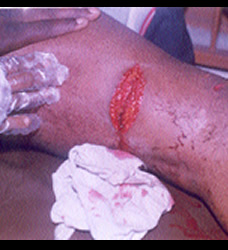


Posted by By Christopher Oji on



Mixed reactions have been trailing the ongoing war declared on members of the National Union of Road Transport Workers (NURTW) by soldiers in Lagos.
Mixed reactions have been trailing the ongoing war declared on members of the National Union of Road Transport Workers (NURTW) by soldiers in Lagos.
While some people are happy, others are sad, over the soldiers' fatwa on members of the union and touts on Lagos roads.
A student of the Lagos State University (LASU), Miss Nora Steven praised the soldiers and policemen for their action, which she described as the best thing that has happened in the six years of civilian administration.
She said: "For two years that I have been passing through Oshodi, I've always been scared. I faced psychological trauma each time I saw these boys. Most often, I see them in my dreams. They've attacked me twice in the past, stealing my telephone handset and bag containing my books."
But leaders of NURTW are claiming that the soldiers have been committing heinous crimes under the guise of chasing touts off the roads, just as some innocent victims were telling their tales of woe.
A man who fell victim during the fracas at Oshodi said he was mistaken for a street urchin and the soldiers gave him a brutal treatment.
Emma Chukwudina, who sells second hand clothes, told Daily Sun: "When I arrived at the market, I saw that the place was deserted, so I asked passers-by if something was amiss. Someone pointed to a side where I saw many soldiers armed with daggers and as I was running away, the man who I was asking questions held my belt and warned that I must follow him or risk being stabbed. And I obeyed, when he brought out a dagger.
"I followed him to where other soldiers were and they got me confused with questions. One person would ask whether I was an area boy. Before I could answer, another person would ask what my mission was in the area, so I got confused. They jumped to the conclusion that I was an area boy and one of them stabbed me in the leg."
Another victim, Michael Okeke, said: "I was coming back from Benin, when I ran into some area boys at Oshodi. They flagged me down and I stopped my vehicle. When they saw the Navy sticker on the windscreen, they vandalised my vehicle and robbed me. They wanted to kill me before they sighted some soldiers running towards us and one of them said: ‘See, they are coming,' and they ran away."
Musbau Adewole, a victim who spoke from his hospital bed, said: "I am a commercial bus driver. I was going to pick my bus at Ladipo, when some soldiers captured me and said I was a motor park tout. But I showed them my driver's licence and they refused to believe that I am a driver. They stabbed several parts of my body. I'm lucky to be alive. Some good Samaritans rushed me to the hospital."
Some victims were not as lucky as Adewole. One of them, Dele Oluwagbemisoke, also a commercial bus driver was killed by soldiers' bullets, while another man identified as Alaba Aka was blinded with a poisonous dagger used by a soldier. Now he feels that he would have been better off dead.
Another victim, who identified himself as Kayode Jolayemi had his leg ripped open with a dagger.
The NURTW is also counting its losses after about 20 of its members have been killed and some of their offices destroyed.
The Alimosho chairman of NURTW, Alhaji Saula Saka, said over N300,000 was carted away when some military boys stormed his office, vandalised the building and injured his boys.
The Army spokesman had said that the attack would go on until the soldiers' mission is accomplished. But the state chairman of NURTW, Alhaji Adesina Ajayi, said the soldiers should spare registered members of the union when they go after touts.
He said: "NURTW is a trade union for workers in the road transport industry, while area boys are street urchins that offer nothing to the society besides causing havoc and chaos."
"Why are the rampaging soldiers maiming our innocent members and destroying our property instead of arresting the area boys. Our union had been crying to the authorities about the menace of area boys and their daily attacks on our members."
Asked how they had been differentiating touts from innocent people, a soldier said: "We have a way of screening those arrested. Don't mind those who are crying, we know the area boys. If we arrest innocent ones, we release them after screening."

